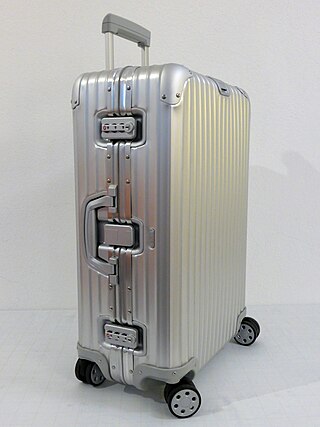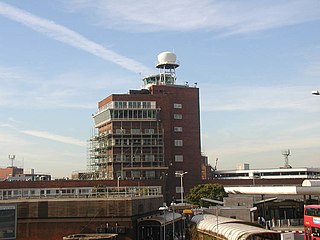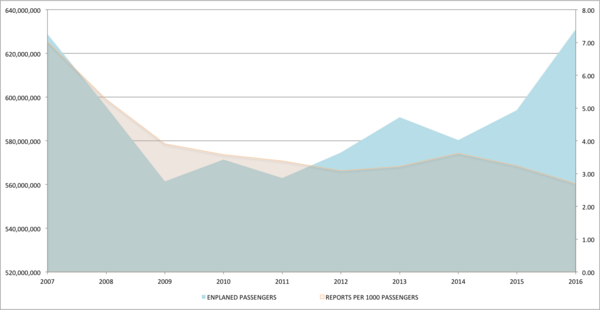The Convention for the Unification of certain rules relating to international carriage by air, commonly known as the Warsaw Convention, is an international convention which regulates liability for international carriage of persons, luggage, or goods performed by aircraft for reward.

The Transportation Security Administration (TSA) is an agency of the United States Department of Homeland Security (DHS) that has authority over the security of transportation systems within, and connecting to the United States. It was created as a response to the September 11 attacks to improve airport security procedures and consolidate air travel security under a combined federal law enforcement and regulatory agency.

Checked baggage is luggage delivered to an airline or train for transportation in the hold of an aircraft, storage on a coach bus or baggage car of a passenger train. Checked baggage is inaccessible to the passenger during the flight or ride, as opposed to carry-on baggage.
The Montreal Convention is a multilateral treaty adopted by a diplomatic meeting of ICAO member states in 1999. It amended important provisions of the Warsaw Convention's regime concerning compensation for the victims of air disasters. The Convention attempts to re-establish uniformity and predictability of rules relating to the international carriage of passengers, baggage and cargo. Whilst maintaining the core provisions which have served the international air transport community for several decades, the treaty achieves modernization in a number of key areas. It protects passengers by introducing a two-tier liability system that eliminates the previous requirement of proving willful neglect by the air carrier to obtain more than US$75,000 in damages, which should eliminate or reduce protracted litigation.

In airport terminals, a baggage reclaim area is an area where arriving passengers claim checked-in baggage after disembarking from an airline flight. The alternative term baggage claim is used at airports in the US and some other airports internationally. Similar systems are also used at train stations served by companies that offer checked bags, such as Amtrak in the United States.

Baggage or luggage consists of bags, cases, and containers which hold a traveler's personal articles while the traveler is in transit. A modern traveler can be expected to have packages containing clothing, toiletries, small possessions, trip necessities. On the return trip, travelers may have souvenirs and gifts. For some people, luggage and the style thereof is representative of the owner's wealth and status. Luggage is constructed to protect the items during travel either with a hard shell or a durable soft material. Luggage often has internal subdivisions or sections to aid in securing items. Handles are typically provided to facilitate carrying, and some luggage may have wheels and/or telescoping handles or leashes to make moving them easier.

In the airline industry, a baggage handler is a person who loads and unloads baggage, and other cargo for transport via aircraft. With most airlines, the formal job title is "fleet service agent/clerk", though the position is commonly known amongst airline employees as a "ramp agent", due to the job's location on the airport ramp (tarmac).

The term hand luggage or cabin baggage refers to the type of luggage that passengers are allowed to carry along in the passenger compartment of a vehicle instead of a separate cargo compartment. Passengers are allowed to carry a limited number of smaller bags with them in the vehicle, which typically contain valuables and items needed during the journey. There is normally storage space provided for hand luggage, either under seating, or in overhead lockers. Trains usually have luggage racks above the seats and may also have luggage space between the backs of seats facing opposite directions, or in extra luggage racks, for example, at the ends of the carriage near the doors.
A skycap is a porter employed at an airport and provides the following services to airline passengers:

Bag tags, also known as baggage tags, baggage checks or luggage tickets, have traditionally been used by bus, train, and airline carriers to route checked luggage to its final destination. The passenger stub is typically handed to the passenger or attached to the ticket envelope:
- to aid the passenger in identifying their bag among similar bags at the destination baggage carousel;
- as proof—still requested at a few airports—that the passenger is not removing someone else's bag from the baggage reclaim hall; and
- as a means for the passenger and carrier to identify and trace a specific bag that has gone astray and was not delivered at the destination. The carriers' liability is restricted to published tariffs and international agreements.

Check-in is the process whereby people announce their arrival at an office, hotel, airport, hospital, seaport or event.

The 2006 transatlantic aircraft plot was a terrorist plot to detonate liquid explosives, carried aboard airliners travelling from the United Kingdom to the United States and Canada, disguised as soft drinks. The plot was discovered by British Metropolitan police during an extensive surveillance operation. A number of security measures were taken in response to the 2006 transatlantic aircraft plot.

Airport check-in is the process whereby an airline approves airplane passengers to board an airplane for a flight. Airlines typically use service counters found at airports for this process, and the check-in is normally handled by an airline itself or a handling agent working on behalf of an airline. Passengers usually hand over any baggage that they do not wish or are not allowed to carry in the aircraft's cabin and receive a boarding pass before they can proceed to board their aircraft.
Interlining, also known as interline ticketing and interline booking, is a voluntary commercial agreement between individual airlines to handle passengers traveling on itineraries that require multiple flights on multiple airlines. Such agreements allow passengers to change from one flight on one airline to another flight on another airline without having to gather their bags or check-in again. Airlines can also promise free rebooking if the connection is lost due to a delay.

An airline ticket is a document or electronic record, issued by an airline or a travel agency, that confirms that an individual is entitled to a seat on a flight on an aircraft. The airline ticket may be one of two types: a paper ticket, which comprises coupons or vouchers; and an electronic ticket.

On the commercial transportation, mostly with airlines, the baggage allowance is the amount of checked baggage or hand/carry-on luggage the company will allow per passenger. There may be limits on the amount that is allowed free of charge, and hard limits on the amount that is allowed.
WorldTracer is a SITA / IATA service provided for the tracking of lost or delayed baggage. It has been in operation for many years and is used by all airlines that are members of IATA. Most of the low-cost carriers that are based in Europe such as Norwegian Air Shuttle, Wizz Air also use WorldTracer.
Luggage Free is a shipping company specializing in worldwide baggage shipping.

Air travel with firearms and ammunition involves a number of laws, regulations and practices that travelers with firearms or ammunition must comply with and should be familiar with before travel. The main rules are set by the International Air Transport Association (IATA), but there are a number of local variations between airlines and local laws that sometimes are conflicting.

Basic economy class is a travel class offered by a number of airlines. The class has superseded economy class as the cheapest airfare option for passengers and generally comes with more restrictions when compared to standard economy fares. Restrictions vary between different airlines, but they generally include not allowing passengers to change or cancel tickets or select seats for free. They are seen as a strategy for market segmentation.
















